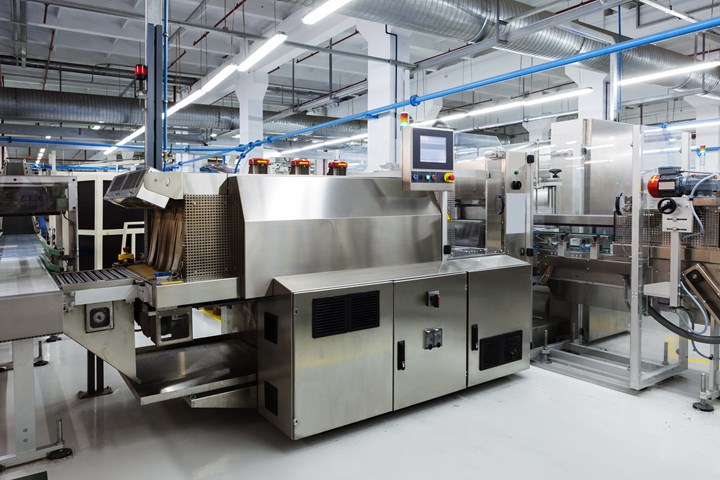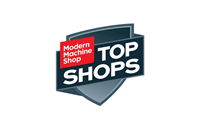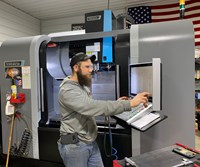10 Characteristics of a Valuable Machine Shop
What is your machining business worth? A recent event focused on machine shop ownership change revealed what machine shop buyers look for in making this evaluation.

If you are the owner of an independent CNC machining business, what is your shop worth? More importantly: How can that value be increased? For a shop owner, the time to think about these questions is long before the owner is seriously contemplating leaving the business. Part of what makes one manufacturing business more valuable than its peers are the processes, relationships and habits of excellence that take a long time to build.

ProShop co-founder Paul Van Metre and I co-hosted the machine shop ownership change event. Van Metre is a former shop owner himself.
I recently co-hosted a half-day event focused on this topic. The Machine Shop Ownership Change Conference was a co-production of Modern Machine Shop and ERP software provider ProShop. The event was virtual. (Find the recording here.) We heard from various CNC machine shop buyers and sellers, as well as experts who have consulted with buyers and sellers, and part of what emerged is a clear picture of the characteristics that distinguish one machine shop from another in determining value.
To be sure, valuing a machining business is hard. Revenue is little help — a shop with impressive revenue might still be operating at a loss. EBIDTA (earnings before interest, debt, taxes and amortization) is helpful, but this just offers a ballpark. Four times EBIDTA represents a reasonable starting point for valuing a shop, but then the actual purchase price can rise or fall significantly based on factors germane to the current and future performance of that business. In listening to the buyers and sellers, here are some of the factors that stood out to me. What makes a machining business valuable? In brief, the important characteristics include all of the following:
1. Customer Loyalty
Can the new owner count on continuing business from current customers? The existence of contracts for future work certainly demonstrate this, but not all shops operate on contracts in this way. Another indicator: a history of correspondence revealing a close working relationship with customers and mutual expectations for the future.
2. Consistent EBIDTA
A great year for the shop that brings up the average earnings might be just a fluke. Conversely, the down years suggest how low the floor can fall.
3. Customer Diversification
A great recent year or projected year for the shop that relies heavily on the activity of just one customer — or perhaps even just one sector — arguably suggests the business’s vulnerability rather than its promise.
4. Unnecessary Owner
This is maybe the most telling factor on the list: How necessary is the owner to daily operations? Unnecessary is best. It is routine in machining businesses for the owner to be programming or running parts, or serving as the sole contact with customers. The owner preparing to sell should prepare replacements for himself in all these roles. A test of the owner’s independence: If the owner takes a two-week vacation, will everything about the shop’s operations and service to customers continue without a hitch?
5. Consistent Processes
This point is closely related to the preceding one. Is the shop governed by unspoken tribal knowledge learned by experience, or are there defined procedures and expectations? The systemized shop is more valuable, because two different systemized shops can merge by adapting their systems to fit. Adapting tribal knowledge in the absence of a defined system is not possible in the same way. Some key questions for identifying a shop that has a consistent process include: Does the shop monitor metrics to evaluate and improve performance? And are members of the management team held accountable for those metrics?
6. Certifications
Another sign of process consistency is conformance to third-party certifications. AS9100 (aerospace) and ISO 13485 (medical) are seen as more valuable than the more general ISO 9001, because the industry-specific certifications address leading industries for machining, and also because the more focused standards are more demanding.
7. Use of ERP
One further sign of process consistency is the use of enterprise resource planning software to organize the shop. Many shops have ERP, but actively using and benefiting from it are another matter. For example, is the shop employing ERP for cost analysis to diagnose quotes that proved inaccurate or jobs it did not win? If the shop runs a work-in-process report from the ERP system, will that report match the actual work in process?
8. Employee Training
A new owner will get to keep the machine tools and other equipment, but will the new owner also get to keep the level of employee skill the shop currently enjoys? A staff of knowledgeable veterans is potentially a vulnerability. More valuable is a staff of various ages and experience levels within a culture that systemizes training by tracking employee competence in key skill areas.
9. Visible Skeletons
Any closely held business that has existed long enough in the world of human choices and relationships is apt to have failings, burdens or peculiarities in its history that could affect the estimation of its value. The way for an owner to think about this is to recognize that all such inconvenient details will come to light during the due diligence phase of a potential sale, so the best course is to deal with them openly and squarely today. For the owner entering into that due diligence process, skeletons disclosed early are less damaging to sale price (or the prospect of any sale at all) than the ones that come out later.
10. Good Times
This last point is different from the others, but it has to do with a potential consequence of building a strong business according to the characteristics above. Namely: Business activity might be good. During some periods, it might be very good. As one former shop owner in the conference stressed, this is the time to sell. The thrill of very profitable times can feel like a reward for building the company well. It is that! And it is human nature to want to enjoy this experience, along with wanting to exit during the down times when winning profitable work is more of a slog. But as with so many things, selling a machining business for its best price is in part a matter of timing. Devote yourself throughout the years to investing in the shop and building the best shop you can, then transition it to the next successful owner during a moment when you can go out on top.
Read Next
How to Scale a Job Shop for Growth with Fewer People
Front office disorganization and poor shop floor communications don’t just reduce a job shop’s efficiency; they are a barrier to growth. Having the right kind of ERP system can be the key to improving profitability and scaling for future growth
Read MoreThe Cut Scene: The Finer Details of Large-Format Machining
Small details and features can have an outsized impact on large parts, such as Barbco’s collapsible utility drill head.
Read More
.jpg;width=70;height=70;mode=crop)






.png;maxWidth=300;quality=90)









.png;maxWidth=300;quality=90)




